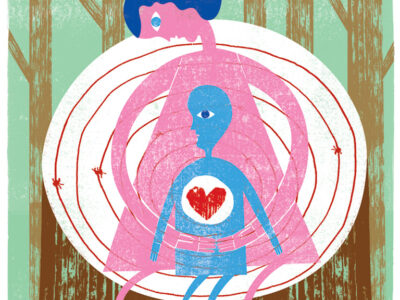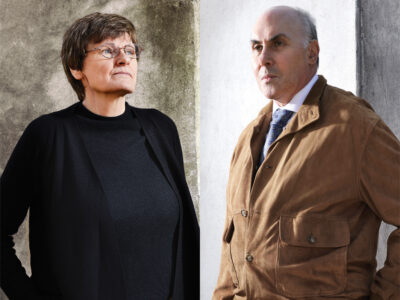
Alternative medicine has long had a sort of Rodney Dangerfield status in American medical circles, one that belies its growing popularity among practitioners and the public. But some recent developments in Penn’s Medical Center and Health System, as well as at other universities, suggest that it is beginning to be taken seriously — in a cautious, scientifically rigorous way — at the highest levels of medicine.
“As the call for alternative medicine increases, it seems appropriate to define the role of alternative medicine in clinical practice, research, and education at the Medical Center and Health System,” said Dr. William N. Kelley, CEO of Penn’s Medical Center and Health System and dean of the School of Medicine, in a letter to members of a newly formed Working Group on the Role of Alternative Medicine at Penn. As a result, he asked the working group to “take inventory of what is going on clinically in alternative medicine throughout the Medical Center and Health System; 2) assess the need for educational offerings to students, faculty, and patients; and 3) evaluate opportunities for research in alternative medicine.” The working group, chaired by Dr. Alfred P. Fishman, emeritus professor and chairman of the Department of Rehabilitation Medicine, has about a dozen members. Some are advocates of alternative medicine; others are considered traditionalists. The group will present its findings by June 30, 1999.
“Our job will be to assess, within our charge of research, education, and clinical practice, what we want to do,” says Fishman. “Not to derange what’s going on, but to incorporate what’s going on in the entire purview of the Health System and the Medical Center.”
Noting that quite a few nurses and physical therapists as well as physicians are now practicing alternative medicine, Fishman says: “The key question is: ‘Where does it fit into the mission of the University, the academic medical center, and the clinical-care system?'”
Alternative medicine is a charged subject for many doctors, but it has been making steady inroads into the profession. As a recent article on the subject in the Chronicle of Higher Education put it: “Old-fashioned physicians who feel that all of the answers for their patients can be found in operating rooms, standard diagnostic manuals, and pharmaceuticals must be doing some double takes when they survey the world of academic medicine these days.”
Fishman points out that the formation of the working group is a “standard process” for making such broad-based decisions. The working group’s recommendations have to be subjected to “traditional scrutiny and critical review.” But, he says: “We’ve already come far down the road.”
One of the working group’s members is Dr. Richard G. Petty, the British-born assistant professor of psychology and clinical director of the neuropsychology program. Petty has been planning two different alternative-medicine programs (he is careful not to use the word “centers”) that he says are in the “advanced stages of planning.”
The first will be “nested in the Department of Psychiatry,” and will have two components. One involves such “interventional modalities” as acupuncture, which Petty himself studied in Britain and China. The other component is “life management,” and will include meditation, tai chi, stress-reduction, coping skills and socialization, and creative visualization.
Petty notes that since certain conditions, such as post-traumatic stress disorder, “seem to derive benefits from treatments with different modalities” — the key phrase, he says, is “seem to” — the idea is to test them. “And, if it works, then apply the extraordinary expertise which we have at Penn to investigate further the mechanisms.
“The objective of all this is to begin collecting research data so we can proceed to serious grant applications,” Petty adds. “The reason we’ve got it within the Department of Psychiatry is that we have a longstanding interest in what we refer to as mind-body interactions.” In addition, he says, Dr. Dwight Evans, the department’s chairman, has been “extremely supportive” of the program.
One who will likely be part of the program is Dr. Andrew Newberg, M’92, a fellow at the Institute of Radiology who has been studying the effects of acupuncture and meditation on the brain as well as other physiological effects of religious and spiritual experiences. By using imaging techniques, he says, meditation is a “very studyable experience — it makes for as good science as you can get.”
The bottom line, he says, is that “we try to look at the whole purpose of this, the whole notion that the brain and the body are very interconnected.” And psychiatry, he says, looks at the whole picture — mind and body as well as the spiritual and social sides — in “a more integrated way than some other fields.”
The second alternative-medicine program would be undertaken with the Cancer Center. Petty and Evans recently met with Dr. John Glick, the center’s director (and a member of the working group), and all three “agreed that we really want to do this.”
“One of the reasons for my interest in working in the Cancer Center,” explains Petty, “is that we know, from experience gathered in England at the Royal Postgraduate Medical School, that some of these modalities can be very helpful to cancer patients — not to shrink the tumors but because they can enable people to withstand the rigors of chemo- and radiation therapies. So the idea is that we may well be able to help with many of the very debilitating ancillary problems that go with cancer, such as fatigue, nausea, and vomiting as a consequence of treatment.
“This is real stuff,” he adds. “We consequently are very careful to say that this is a research institution, so we’re taking a calm, calculated approach. We’re ideally placed at Penn to do these things. We think we can do it better than any place in the world.”
And, he concludes: “We are absolutely determined that if we do this as we plan to, that we will do it absolutely correctly — that the medicine will be of the highest standards, that the highest ethical standards will be used and the highest scientific standards.”
“Ultimately, you have to let science make the decisions,” says Newberg. “The main goal is to advance the science so we can make the decisions that allow us to combine these therapies into one integrated package.”




